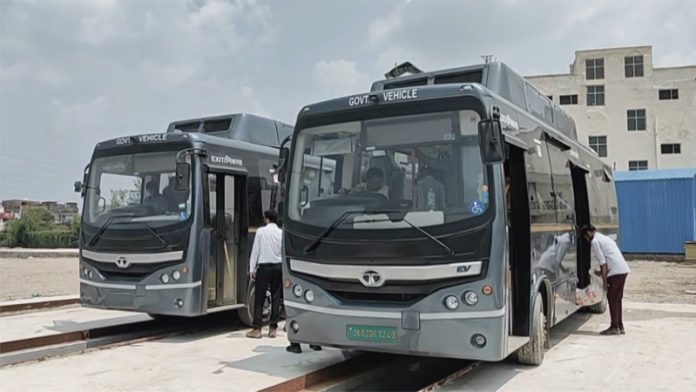As the world grapples with the urgency of combating climate change, transitioning to sustainable modes of transportation becomes imperative. There is a worldwide transition going on towards alternative modes of transportation, and electric buses are leading the pack. Many metros and other cities have already adopted electric buses in India. In this regard, the recent introduction of electric buses (e-buses) in Jammu marks a significant step towards reducing emissions and improving the city’s air quality. The deployment of electric buses on Jammu’s roads is a testament to the city’s commitment to sustainable urban development. With the arrival of 75 nine-metre e-buses and the imminent delivery of 25 larger twelve-metre variants, Jammu is embracing eco-friendly transportation solutions. These buses, operated by Jammu Smart City Limited (JSCL), not only reduce carbon emissions but also contribute to noise reduction, offering commuters a quieter and more pleasant journey. One of the key advantages of these electric buses is their potential to revolutionise public transportation in the region. Equipped with high-back seats, CCTV cameras, lifts for the physically challenged, and other modern amenities, these buses prioritise passenger comfort and safety. Furthermore, the integration of digital ticketing systems and acceptance of the National Common Mobility Card streamline the commuting experience, making it more convenient and accessible for all residents.
However, while this initiative showcases commendable progress, there are areas where further enhancement and inclusivity are necessary. Despite the promising advancements, some challenges need to be addressed to ensure the seamless operation of e-buses in Jammu. The delay in vehicle registration and insurance poses a significant hurdle, hindering the timely deployment of the larger e-buses designated for key routes like Jammu-Udhampur, Jammu-Katra, and Jammu-Kathua. Authorities need to expedite these processes to maximise the benefits of sustainable transportation for the community. Moreover, while the implementation of charging infrastructure is underway, there is a need for comprehensive planning to ensure adequate coverage across all routes. Charging stations in Udhampur, Kathua, and Katra are essential to support the long-distance operations of e-buses and instil confidence among commuters regarding range and reliability. Collaborative efforts between Government agencies and private stakeholders are crucial to accelerating the establishment of these critical infrastructures. Additionally, the issues of fare affordability and inclusivity deserve attention. While the introduction of e-buses offers numerous benefits, it is essential to ensure that transportation remains accessible to all segments of society. Discounted fares for physically disabled persons, senior citizens, and women can enhance equity and promote social inclusion. Initiatives to incentivize digital payments and provide discounts for cashless transactions further encourage the adoption of sustainable transportation practices.
Furthermore, leveraging Government subsidies such as the Faster Adoption and Manufacturing of Hybrid and Electric Vehicles (FAME) scheme is essential to supporting the economic viability of e-buses. By passing on these subsidies to suppliers like TATA, JSCL can mitigate operational costs and maintain affordable fares for passengers. Continued collaboration between public and private entities is vital to sustainably fund and operate electric buses in the long term. Additionally, exploring alternative renewable energy sources for charging these buses could further enhance their environmental benefits.
Looking ahead, the successful integration of electric buses into Jammu’s public transport system holds promise for fostering a greener and more sustainable future. As these vehicles undergo trial runs and eventually enter public service, it is crucial to prioritise transparency, accountability, and community engagement. Public feedback and stakeholder involvement are invaluable in refining operations, addressing concerns, and optimising the performance of e-buses to meet the evolving needs of commuters. The introduction of electric buses in Jammu represents a significant milestone in the city’s journey towards sustainable urban mobility.
Trending Now
E-Paper


